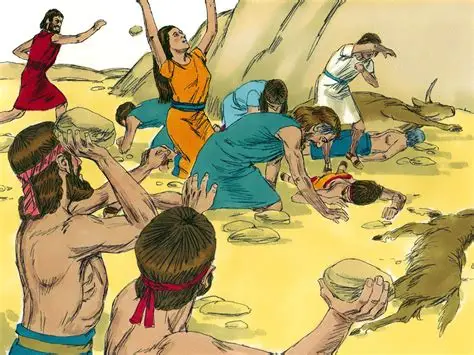THE CONSEQUENCES OF HIDDEN DISOBEDIENCE
THE SEED
“Pardon your servant, Lord. What can I say, now that Israel has been routed by its enemies?” Joshua 7:8
Israel, under the leadership of Joshua, went to battle against Ai but suffered a surprising and painful defeat. Joshua, who was confident in God’s promise of victory, was deeply distressed. He cried out to the Lord, expressing his confusion and shame. The cause of this defeat was uncovered, Achan had violated God’s command by stealing and hiding forbidden items. His disobedience brought judgment upon the entire nation. Once the source of sin was identified and dealt with, Israel returned to battle and conquered Ai victoriously. Achan’s disobedience caused Israel to turn her back before her enemies. One man’s sin nearly destroyed an entire nation! This serves as a reminder that our actions and decisions can significantly impact those around us, either positively or negatively. Avoiding selfish ambition, greed, and self-centeredness can prevent unnecessary tragedy. When we intentionally choose to obey God’s commandments, we position ourselves for consistent victory, and we will never need to turn our backs before our enemies.
BIBLE READING: Joshua 7:8–14
PRAYER: Holy Spirit, purge my life. Give me victory over temptation, so that I do not turn my back before my enemies, in Jesus’ name. Amen.
AWỌN ABAJADE TI AIGBỌRAN IKỌKỌ
IRUGBIN NAA
“Dariji ìránṣẹ́ rẹ, Olúwa. Kí ni mo lè sọ, nígbà tí a ti lé Ísráẹ́lì kúrò níwájú àwọn ọ̀tá rẹ̀?” Jóṣúà 7:8.
Ísráẹ́lì, lábẹ́ àkóso Jóṣúà, lọ sí ogun lòdì sí Ai ṣùgbọ́n wọ́n ri ijakule tí ó yà wọ́n lẹ́nu àti tí ó dùn wọ́n. Jóṣúà, tí ó ní ìgbàgbọ́ nínú ìlérí Ọlọ́run fún ìṣẹ́gun, ní ìrẹ̀wẹ̀sì ọkàn púpọ̀. Ó kígbe sí Olúwa, ó sọ ìdààmú àti ìtìjú rẹ̀. Wọ́n ṣí àṣírí ìdí ìṣẹ́gun náà, Akani ti rú òfin Ọlọ́run nípa jíjí àti fífipamọ́ àwọn ohun tí a ti kọ̀. Àìgbọràn rẹ̀ mú ìdájọ́ bá orílẹ̀-èdè náà lápapọ̀. Nígbà tí wọ́n ti ṣe àwárí orisun ẹ̀ṣẹ̀ náà tí wọ́n sì ṣe ìtọ́jú rẹ̀, Ísráẹ́lì padà sí ogun wọ́n sì ṣẹ́gun Ai pẹ̀lú ìṣẹ́gun. Àìgbọràn Akani fà á tí Ísráẹ́lì fi yí ẹ̀yìn padà síwájú àwọn ọ̀tá rẹ̀. Ẹ̀ṣẹ̀ ọkùnrin kan fẹ́rẹ̀ pa orílẹ̀- èdè kan run! Èyí jẹ́ ìrántí pé ìṣe àti ìpinnu wa lè ní ipa tí ó tóbi lórí àwọn tí ó yí wa ká, yálà ní rere tàbí ní búburú. Yíyẹra fún ìfẹ́ àìlódodo, oju kokoro, àti ìfẹ́ ara ẹni nìkan lè dènà àjálù àìní láti ṣẹlẹ̀. Nígbà tí a bá yan láti ṣe ìgbọràn sí àwọn òfin Ọlọ́run, a gbé ara wa sí ipò fún ìṣẹ́gun tí ó dúró, a kò sì ní láti padà ẹ̀yìn síwájú àwọn ọ̀tá wa mọ́.
BIBELI KIKA: Jóṣúà 7:8–14.
ADURA: Ẹ̀mí Mímọ́, fọ ìgbé ayé mi mọ́. Fún mi ní ìṣẹ́gun lórí ìdáǹwò, kí n má bàá padà ẹ̀yìn síwájú àwọn ọ̀tá mi, ní orúkọ Jésù. Àmín.
